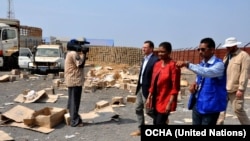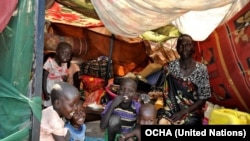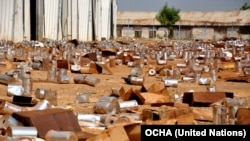MALAKAL —
More than 825,000 people have been displaced by violence in South Sudan, U.N. humanitarian chief Valerie Amos said Thursday, warning that an already dire humanitarian situation in the young country s likely to get worse until people are convinced it is safe to go back to the homes they fled during nearly six weeks of unrest.
"More than 702,000 people have been displaced by the conflict across the country, and another 123,000 have fled into neighboring countries," Amos told reporters Wednesday as she wrapped up a three-day visit to South Sudan that has taken her to hot-spots in the fighting, including the oil town of Malakal and the capital, Juba, where the conflict erupted on Dec. 15.
In Malakal, Amos said she "saw people in dire circumstances: short of food, living in conditions with poor sanitation and very little water."
"I met women who had walked for days to seek protection and assistance; children who had been separated from their parents as they fled; and people who said they had been targeted and abused because of their ethnicity or political affiliation," she added.
Amos praised humanitarian agencies that that remained in South Sudan and continued to deliver aid even as fighting raged.
"While this has saved many lives, we have not been able to provide assistance to many others due to the continuing insecurity," she said.
Aid workers have been able to reach more than 300,000 displaced people, which is fewer than half of those internally displaced in South Sudan.
In Malakal, Amos said, "tens of thousands" need assistance but many aid agencies have halted work in the town because of the violence, which has directly targeted humanitarian workers and organizations.
International medical aid group Doctors Without Borders (MSF) suspended activities in Malakal last week after its compound was looted by armed men and its staff threatened.
Amos said she saw World Food Programme (WFP), International Organization for Migration (IOM) and UNICEF warehouses in Malakal that had been ransacked by looters.
Acts of violence against aid workers have also affected their ability to deliver assistance to needy South Sudanese, some 3.7 million of whom are "severely food insecure," Amos said.
But, she added that she was "encouraged" by the agreement to cease hostilities that was signed last week in Ethiopia.
"I hope the agreement will lead to an environment where people will feel able to return to their homes and rebuild their lives," she said.
Few of the displaced in South Sudan are willing to do that now.
Of the 702,000 internally displaced South Sudanese, some 79,000 are sheltering at eight bases of the U.N. Mission in South Sudan (UNMISS). Nearly a third of them -- around 26,000 -- have sought refuge at the U.N. compound in Malakal.
Others have sought shelter from the fighting anywhere they can find it, including places of worship and Malakal Teaching Hospital, where Yusuf Anur fled more than two weeks ago.
"Right now, we are living here. We are suffering..." Anur told VOA News, adding that he sleeps in the open and is lucky to get one meal a day.
In spite of the difficult conditions at the hospital, where clean water is also in short supply, Anur says he has no plans to return to his home because he in not convinced the fighting has ended.
Sixteen-year-old Sebit John Jok is camping on the grounds of St. Joseph’s cathedral near the center of Malakal., where people don't even feel safe enough to go out and bury those killed in the fighting, he said.
"Maybe, if they pick up all the dead people in there, I will go there to my house," he told VOA.
But if he did return home, he would be all alone, he said.
"All the neighbors, they’re gone. There is nobody in the house there,” the teen said.
The U.N. says more than 64,000 people in Malakal County were displaced in two waves of fighting as pro- and anti-government forces battled for control of the capital of oil-rich Upper Nile state.
Government forces regained control of Malakal town last week. But the head of the IOM office in the town, Donavan Naidoo, said that in spite of the signing of the cessation of hostilities agreement, he expects more people to seek refuge at the U.N. base in Malakal.
"They do not feel safe at night. They feel that UNMISS will be providing the best security for them,” he said, noting that there are still reports of gunfire around the town.
Meanwhile, Amos warned that crowded conditions at the sites where the displaced have gathered could pose a serious health hazard.
“There’s a potential health hazard in these informal camps that have now sprung up. Way too many people, not enough water, not enough food,” she said.
Naidoo said officials are particularly concerned by the possible spread of cholera and hepatitis E, both of which are associated with contaminated water supply.
But aid agencies are unable to take steps to try to avert outbreaks in battle-torn South Sudan, he said.
“At the moment, with the space issue… we don’t have adequate space to build further sanitation facilities. And that creates a health concern, not only for the IDPs, but for the base itself,” Naidoo said.
A response plan for the South Sudan crisis, released last month by the U.N. Office for the Coordination of Humanitarian Affairs (OCHA), called for $209 million to meet the most immediate needs of the country, including camp management, food, health, shelter, protection, water, sanitation and hygiene. Aid agencies have secured around $109 million of the immediate requirements for the emergency response, OCHA said.
"More than 702,000 people have been displaced by the conflict across the country, and another 123,000 have fled into neighboring countries," Amos told reporters Wednesday as she wrapped up a three-day visit to South Sudan that has taken her to hot-spots in the fighting, including the oil town of Malakal and the capital, Juba, where the conflict erupted on Dec. 15.
In Malakal, Amos said she "saw people in dire circumstances: short of food, living in conditions with poor sanitation and very little water."
"I met women who had walked for days to seek protection and assistance; children who had been separated from their parents as they fled; and people who said they had been targeted and abused because of their ethnicity or political affiliation," she added.
Amos praised humanitarian agencies that that remained in South Sudan and continued to deliver aid even as fighting raged.
"While this has saved many lives, we have not been able to provide assistance to many others due to the continuing insecurity," she said.
Aid workers have been able to reach more than 300,000 displaced people, which is fewer than half of those internally displaced in South Sudan.
'Tens of thousands' need aid in Malakal
In Malakal, Amos said, "tens of thousands" need assistance but many aid agencies have halted work in the town because of the violence, which has directly targeted humanitarian workers and organizations.
International medical aid group Doctors Without Borders (MSF) suspended activities in Malakal last week after its compound was looted by armed men and its staff threatened.
Amos said she saw World Food Programme (WFP), International Organization for Migration (IOM) and UNICEF warehouses in Malakal that had been ransacked by looters.
Acts of violence against aid workers have also affected their ability to deliver assistance to needy South Sudanese, some 3.7 million of whom are "severely food insecure," Amos said.
But, she added that she was "encouraged" by the agreement to cease hostilities that was signed last week in Ethiopia.
"I hope the agreement will lead to an environment where people will feel able to return to their homes and rebuild their lives," she said.
Few of the displaced in South Sudan are willing to do that now.
Of the 702,000 internally displaced South Sudanese, some 79,000 are sheltering at eight bases of the U.N. Mission in South Sudan (UNMISS). Nearly a third of them -- around 26,000 -- have sought refuge at the U.N. compound in Malakal.
Others have sought shelter from the fighting anywhere they can find it, including places of worship and Malakal Teaching Hospital, where Yusuf Anur fled more than two weeks ago.
Lucky to get one meal a day
"Right now, we are living here. We are suffering..." Anur told VOA News, adding that he sleeps in the open and is lucky to get one meal a day.
In spite of the difficult conditions at the hospital, where clean water is also in short supply, Anur says he has no plans to return to his home because he in not convinced the fighting has ended.
Sixteen-year-old Sebit John Jok is camping on the grounds of St. Joseph’s cathedral near the center of Malakal., where people don't even feel safe enough to go out and bury those killed in the fighting, he said.
"Maybe, if they pick up all the dead people in there, I will go there to my house," he told VOA.
But if he did return home, he would be all alone, he said.
I met women who had walked for days to seek protection and assistance; children who had been separated from their parents as they fled...UN Humanitarian chief Valerie Amos during visit to South Sudan
"All the neighbors, they’re gone. There is nobody in the house there,” the teen said.
The U.N. says more than 64,000 people in Malakal County were displaced in two waves of fighting as pro- and anti-government forces battled for control of the capital of oil-rich Upper Nile state.
Government forces regained control of Malakal town last week. But the head of the IOM office in the town, Donavan Naidoo, said that in spite of the signing of the cessation of hostilities agreement, he expects more people to seek refuge at the U.N. base in Malakal.
"They do not feel safe at night. They feel that UNMISS will be providing the best security for them,” he said, noting that there are still reports of gunfire around the town.
Cramped conditions pose health hazard
Meanwhile, Amos warned that crowded conditions at the sites where the displaced have gathered could pose a serious health hazard.
“There’s a potential health hazard in these informal camps that have now sprung up. Way too many people, not enough water, not enough food,” she said.
Naidoo said officials are particularly concerned by the possible spread of cholera and hepatitis E, both of which are associated with contaminated water supply.
But aid agencies are unable to take steps to try to avert outbreaks in battle-torn South Sudan, he said.
There’s a potential health hazard in these informal camps that have now sprung up. Way too many people, not enough water, not enough food.UN Humanitarian Chief Valerie Amos during visit to Malakal
“At the moment, with the space issue… we don’t have adequate space to build further sanitation facilities. And that creates a health concern, not only for the IDPs, but for the base itself,” Naidoo said.
A response plan for the South Sudan crisis, released last month by the U.N. Office for the Coordination of Humanitarian Affairs (OCHA), called for $209 million to meet the most immediate needs of the country, including camp management, food, health, shelter, protection, water, sanitation and hygiene. Aid agencies have secured around $109 million of the immediate requirements for the emergency response, OCHA said.














